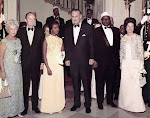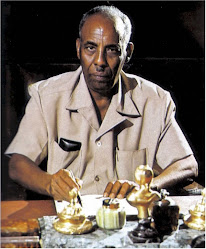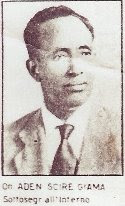Sending the boys home
 African Union troops in the Somali capital have pushed back Islamist fighters
African Union troops in the Somali capital have pushed back Islamist fighters
A day earlier Major Mbusi narrowly escaped with his life when a mortar landed nearby without exploding. Fired by the Shabab militia—linked to al-Qaeda—it lacked a charge and instead contained a 12.7mm machine-gun cartridge. The Islamist fighters may be finding it hard to supply their lines, he says. In any case, their fortunes seem to be changing.
For the past three years some 8,000 Ugandan and Burundian troops have served under the command of the African Union (AU) in Mogadishu without great effect. They operate under a “peacemaking” mandate bankrolled mainly by the Americans. Fighting alongside them are soldiers loyal to the Somali transitional government of President Sheikh Sharif Ahmed, forces of Ahla Sunna Waljama, a moderate religious movement, and a smattering of other gunmen. Their opponents number several thousand and call themselves Shabab, or “boys” in Arabic. They control most of southern Somalia.
A Shabab offensive in August and September was aimed at taking control of the capital but failed dismally. Some 700 Shabab fighters were killed and many more wounded. Among the dead were foreigners from Uzbekistan, Saudi Arabia and Chechnya. As the jihadists foundered, the Ugandans and Burundians thrust forward in a pincer movement towards the Bakara market, the city’s commercial hub.
The Shabab now control only 40% of Mogadishu proper (excluding sparsely populated outlying districts), down from about 60% a few months ago. Officials in charge of food distribution say there has been a drift of displaced people from Shabab districts to government areas, boosting commerce.
Transport has improved, too. The Makaal Mukarama Road, which links the presidential palace with the AU headquarters at the airport, was previously unsafe. The Shabab targeted it with improvised explosive devices, machinegun-fire and mortars. Now packed minibuses and private cars pass up and down, and the Ugandans have handed over many of the checkpoints to lightly armed Somali government troops.
The Ugandans have also pushed the Shabab back from the presidential palace, a significant success. In some places earlier this year they were only a few metres away. Now they are fighting in the mixed district of Bondere, some 400 metres from the centre of government.
The Burundians too have discovered new courage. Under heavy fire they captured Mogadishu’s old military hospital, which had been a Shabab stronghold.
Across most of the city, AU troops have now pushed back Shabab positions by as much as a kilometre (0.6 miles). The presidential palace remains within range of Shabab fire, but the port—under regular attack six months ago—has not been hit by a mortar since October. The AU’s mandate allows it to attack only once it has been fired upon, but that does not seem to have been a hindrance.
The Shabab are far from beaten, yet their ability to attack government officials and their buildings has been noticeably reduced. “We have killed their mortar experts and degraded their weapons,” says Colonel Michael Ondoga, a Ugandan commander.
Encouraged by recent victories, AU commanders have developed ambitious new plans. With the help of reinforcements, they hope to push the Shabab out of the Bakara market. A UN Security Council meeting in New York this week will decide whether to offer additional funds. The government’s main source of official revenues is a paltry $1m a month in port fees.
Mohamoud Ahmed Nur, the mayor of Mogadishu, is optimistic that life will start to improve. He reckons the city has 1.2m residents, half of them under 18. A third are displaced and many live in makeshift plastic shelters. Literacy is low and hunger is a big concern, making the well-funded Shabab an attractive employer.
 The effort to provide better services is led by Mohamed Abdullahi Mohamed, a former employee of the New York state transportation department who was recently appointed prime minister. He spends most of his time in a rudimentary office trying to avoid assassination. “I don’t want to sound Republican, but we have the smallest government,” he says.
The effort to provide better services is led by Mohamed Abdullahi Mohamed, a former employee of the New York state transportation department who was recently appointed prime minister. He spends most of his time in a rudimentary office trying to avoid assassination. “I don’t want to sound Republican, but we have the smallest government,” he says. Among the hopeful signs he sees are alleged splits in the Islamist movement between pragmatists and those committed to fighting to the death for global jihad. In Shabab areas of the city, pro-government radio stations are expanding their audience, it is said.
But suggestions that the Shabab have been beaten look premature. The group has shown an ability to revive itself. Attempts to infiltrate it have often backfired. And a fall in the number of roadside bombs and suicide bombings may be tactical. Many Somalis still respond to Shabab sermons, which cloak Somali irredentism with the banner of Islam.Economist, UK
from PRINT EDITION | Middle East & Africa




.jpg)











No comments:
Post a Comment